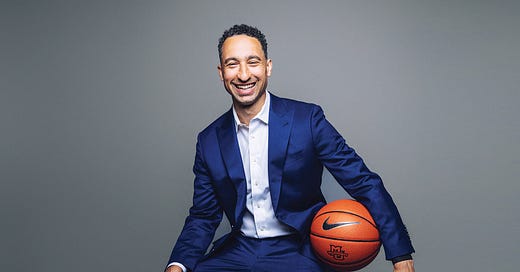Facing PTSD: Coaching Through the Unseen Scars of Youth Sports (Faith Based Version)
Elevate your team's potential through learning how to be aware of trauma with your athletes. Expert advice, practical strategies, and inspiring stories delivered to your inbox. Free!
The Opening Line from Jim and Jason
Encouragement and perspective for PTSD Awareness Month.A Message from Matt Brandmeyer
Founder of Structured Support and Licensed TherapistChampions of Change: Shaka Smart – Coaching the Heart Before the Player
What the Marquette coach can teach us about coaching the person before the player.In the spotlight: PTSD Awareness – The Unseen Game on Your Team
PTSD among athletes and how coaches are uniquely positioned to help.The Reality Check: The Lingering Shadows of Untreated Trauma
It’s time to confront a deeper truth about the mental health crisis we're witnessing in youth sports.The Deep Dive: Unpacking Trauma's Bio-Psycho-Socio Roots
Unpacking the cultural, family, and systemic forces affecting our athletes.The Toolbox: Your 2-Minute Connection
One simple shift that can make a world of difference.Game-Changing Quote
This week’s wisdom from Rocky Balboa.The Joy of the Game
The pressure of the handshake is real…Partner Spotlight – BMS Project
The Opening Line From Jim and Jason
Coaches,
You carry more than a clipboard. You carry the weight of kids’ futures and sometimes their pasts too. This June, as we shine a light on PTSD Awareness, we want to acknowledge the incredible dedication you bring to your role. You are more than coaches; you are mentors and role models. Often, you are a lifeline for young athletes navigating the intense pressures of youth sports.
We understand the unique challenges you face: the long hours, the emotional investment, and the immense responsibility for these young lives. But your influence extends far beyond the win-loss column. You have the power to instill invaluable life skills. As it is written in Proverbs 22:6, "Train up a child in the way he should go; even when he is old he will not depart from it." Your guidance in these formative years lays a spiritual foundation.
Despite massive investments in youth sports, mental health challenges are unfortunately on the rise. This paradox highlights an unseen battle our young leaders are fighting. This month, we're focusing on trauma – a critical aspect of mental health that impacts our athletes. We are reminded that "a man's foes shall be they of his own household" , and sometimes, the deepest battles are fought within the mind and soul.
Remember, the most effective coaches prioritize making the people around them better. Let’s use this month as a reminder to:
Be present: Listen for subtle cues, knowing unseen struggles, like trauma, can impact performance and behavior. Be present, for "where two or three are gathered in my name, there am I among them" (Matthew 18:20). Your attentive presence can be a reflection of God's unwavering presence in their lives.
Be understanding: Recognize that past difficult experiences might manifest in unexpected ways, fostering an environment of support, not judgment. "Judge not, lest ye be judged". Embrace empathy, for it is a powerful glue that binds humanity.
Be empowering: Guide athletes to build mental fortitude and emotional resilience, turning challenges into opportunities for profound growth. "I can do all things through Christ who strengthens me" (Philippians 4:13). Inspire them to embrace a Growth Mindset , seeing every challenge as a divine training ground for what's next in God's plan for their lives.
Your commitment to their holistic development shapes not only their athletic careers but their entire lives, reflecting the truth that God has a divine design for each individual.
Thank you for being the leaders our athletes truly need.
Jason and Jim
A Special Message from Matt Brandmeyer from Structured Support!
This month, we're honored to shine a spotlight on Matt Brandmeyer, a visionary leader whose work at Structured Support deeply resonates with our mission at 4D Leaders. Matt's insights are invaluable for coaches striving to develop holistic leaders, especially in navigating the complex emotional landscape of youth sports today. He champions the idea that coaches play a crucial role in helping players process and build resilience from trauma. His approach emphasizes creating supportive environments and understanding that difficult experiences, when properly addressed, can become catalysts for profound growth – transforming adversity into an opportunity for athletes to become stronger, more confident individuals both in sports and in life. You can learn more about Matt and his work by clicking here.
“At first, I coached for control. Now, I coach for connection.”
– Shaka Smart
“At first, I coached for control. Now, I coach for connection.” – Shaka Smart
Shaka Smart is one of the most respected coaches in college basketball, not just for his success on the court, but for how he evolved off it. Early in his career, Smart was known for his relentless, high-pressure “Havoc” style and intensity. But behind the energy was a coach who hadn’t yet understood the emotional needs of his players.
That changed when he realized many of the athletes he was recruiting and coaching were carrying unseen emotional wounds from poverty, violence, broken homes, or personal loss. This realization echoes the biblical truth that "a man's foes shall be they of his own household" – sometimes, the deepest struggles are internal and stem from one's origins.
Smart began to shift his coaching philosophy from demanding effort through intensity to drawing it out through trust, love, and understanding. This aligns with the principle that "Love is the foundation of our leadership. It belongs to the workplaces as much as to our homes". He started asking deeper questions, checking in with players not just on their game, but on their life. This demonstrates the profound impact of seeing everyone as a teacher and being open to learning from those you lead.
In one interview, Smart said:
“Some of these guys have been through more trauma by 18 than I have in my entire life. If I don’t understand where they’re coming from, how can I expect to get the best out of them?”
He implemented daily connection practices, where he made it a point to talk to each player about something unrelated to basketball. This embodies the teaching that "By giving your attention, curiosity, and focus to someone, you make them feel seen, valued, and understood". He also emphasized emotional safety and leadership development, bringing in psychologists, mindset coaches, and even yoga and mindfulness to help players self-regulate. This holistic approach resonates with 4D Leaders' core belief that athletics are platforms for holistic human development, fostering resilience, emotional intelligence, and leadership skills. This is a practical application of our "village mentality" which focuses on the tripartite influence model to promote holistic development in student leaders.
The result? His teams still play hard—but they play with joy, unity, and trust. At Marquette, he’s not just building winning teams—he’s building young men who can handle adversity with strength and compassion, demonstrating that true leadership is "not about making yourself powerful but about welcoming, encouraging, and bringing forth the power of others". This exemplifies the spirit of "Love one another" (John 13:34), where love or God will take every care of all things in the game of life.
In the spotlight: PTSD Awareness – The Unseen Game on Your Team
Let's talk about that athlete who seems off, withdrawn, or unexpectedly reactive?. Maybe they’re usually stellar but suddenly struggle with focus in clutch moments. Or perhaps a player, typically even-keeled, melts down over a minor mistake, or becomes withdrawn and quiet. We might label these as "attitude problems" or "a bad day." But what if it's something deeper? An unseen battle playing out beneath the surface? As the scripture reminds us, "For we wrestle not against flesh and blood, but against principalities, against powers, against the rulers of the darkness of this world, against spiritual wickedness in high places" (Ephesians 6:12). Sometimes, the battles our young ones face are not visible to the eye.
This June, for PTSD Awareness Month, I want to shed light on how trauma can quietly impact the young leaders you guide.
What is Trauma (Beyond the Obvious)? When I talk about trauma, I'm not just referring to major, dramatic events like natural disasters or severe accidents. Trauma can also stem from:
Persistent stress: Things like chronic instability at home. "The righteous desires of the heart: Health, Wealth, Love, Friends, Perfect Self Expression, His highest ideals."
Emotional experiences: Bullying, a perceived constant lack of safety, or even a series of seemingly smaller, distressing experiences that overwhelm a child’s capacity to cope.
How Trauma Shows Up on Your Team: These experiences aren't always obvious, but they manifest in ways that impact both their performance and behavior:
Emotional & Mental Strain: Increased anxiety, emotional dysregulation, or unexplained apathy. "An invasive and instant darkness that he couldn't escape; this ominous darkness told him that this life wasn't worth living."
Focus Issues: Difficulty with concentration, decision-making. "Anger blurs the visions, poisons the blood, is the root of many diseases and causes wrong decisions leading to failure."
Social Challenges: Withdrawal or sudden emotional outbursts.
Why This Matters (A Critical Insight): Crucially, many of these traumas often go untreated, sometimes for years, profoundly shaping an individual’s responses to stress and pressure. "Emotions that go suppressed will eventually surface one way or another." What’s even more insightful is that trauma can be passed down through generations—a concept rooted in Family Systems Theory, where patterns of behavior and emotional responses can be transmitted across family units. "Children are receptive and sensitive to the thoughts of others about them and often outpicture the fears of their parents." These unseen burdens directly impact the "Heart" and "Mind" aspects of our 4D holistic development framework, as we strive for "Living in Balance with God".
The key takeaway for coaches? You don't need to be a therapist. Your role is about creating a safe, predictable, and supportive environment where young leaders can feel secure enough to focus, learn, and grow, even as they carry these hidden experiences. Remember, "God is all-knowing and He is omnipresent. He will be your eternal guide if you listen, observe, and act when He tells you to move your feet". By creating such an environment, you become a vessel for divine compassion and a true shepherd of their potential.
The Reality Check: The Lingering Shadows of Untreated Trauma
It’s time to confront a deeper truth about the mental health crisis we're witnessing in youth sports. It’s more than just the immediate pressures of competition; much of what we see stems from untreated trauma and the profound impact of issues that get passed down from generation to generation. As the Psalmist cries out, "My soul is cast down within me" (Psalm 42:6), echoing the deep spiritual and emotional toll that unseen battles take.
This harsh reality creates a critical paradox:
THE PARADOX:
Billions Invested: We pour immense resources into athletic development, facilities, and specialized training.
Mental Health Declining: Yet, alarming rates of anxiety, depression, burnout, and even suicide are escalating among young athletes. "Collect evidence on the mental health challenges faced by student-athletes, such as anxiety, depression, burnout, and the rising rates of suicide among young athletes." This is a stark reminder that "Man shall not live by bread alone, but by every word that proceedeth out of the mouth of God" (Matthew 4:4)—physical prowess without spiritual and mental fortitude is insufficient.
THE ROOT CAUSES:
Untreated Emotional Wounds: This crisis is largely a manifestation of deep, unhealed emotional wounds. Trauma, from chronic stress to significant life events, often goes unrecognized and untreated. "It hurts, but the truth is people end up hurting themselves even more by suppressing them instead of expressing them." We are called to "He restoreth my soul" (Psalm 23:3), which means nurturing the subconscious mind with right ideas.
The Invisible Inheritance: Many emotional and mental patterns in athletes—from chronic anxiety to self-sabotage—can be echoes of trauma inherited through their family system. "Children are receptive and sensitive to the thoughts of others about them and often outpicture the fears of their parents." These subconscious "records" impact their ability to cope. "I now smash and demolish (by the spoken word) every untrue record in my subconscious mind. They shall return to the dust-heap of their native nothingness for they came from my own vain imaginings."
Impact on Mind & Emotions: Untreated trauma profoundly affects:
The Mind: Hindering focus, decision-making, and the ability to learn from mistakes. "Anger blurs the visions, poisons the blood, is the root of many diseases and causes wrong decisions leading to failure."
The Emotions: Leading to suppressed feelings, apathy, sudden outbursts, and emotional dysregulation. "Emotions that go suppressed will eventually surface one way or another." (I can speak to this personally, having experienced how suppressed emotions can resurface years later ). "The saddest words of tongue or pen, are these ‘It might have been!’"
WHY IT PERSISTS:
"Win-at-All-Costs" Culture: Our sports environment often prioritizes performance over well-being, inadvertently pushing deeper emotional issues underground. "Investigate how the culture within athletic departments, heavily focused on performance and winning, may contribute to the lack of mental health resources and support." We must remember that "God sees man perfect, 'created in his own image,' (imagination) and given 'power and dominion'."
Systemic Gaps: Despite the problem's scale, adequate mental health support and resources within athletic systems are critically lacking, preventing identification and treatment of these deep-seated issues.
Understanding these profound, often hidden, dimensions of trauma is crucial. It changes how we see challenges and empowers us to create a truly supportive environment for every young leader, reflecting the divine compassion we are called to embody. "Perfect love casteth out fear."
The Deep Dive: Unpacking Trauma's Bio-Psycho-Socio Roots
Truly addressing trauma's impact means looking beyond symptoms to root causes. Our athletes are complex human beings—bio/psycho/socio beings—constantly interacting within various systems. This holistic view empowers us at 4D Leaders to create real change.
Let's break down the interconnected dimensions:
The Biological Dimension (Bio): Traumatic experiences, whether acute or chronic, fundamentally alter the brain's stress response. This can lead to hyper-vigilance, explosive reactions, or sudden shutdowns, hindering focus and consistent performance. Our physical being is a sacred vessel that needs care and understanding.
The Psychological Dimension (Psycho): Untreated trauma deeply affects an athlete's inner world. Suppressed emotions, as I experienced after my father's suicide, don't disappear. Instead, they manifest as anxiety, self-doubt, a shattered self-image, or an inability to forgive, ultimately hindering confidence and resilience. We are called to restore our soul from these burdens.
The Sociological/Systemic Dimension (Socio): Our athletes are profoundly shaped by their "village".
Family Systems Theory reveals that families are emotional units, and coping patterns (or lack thereof) can be passed down through generations. An athlete's anxiety, for instance, might reflect unaddressed emotional dynamics from their family's past. As within, so without.
The Tripartite Influence Model emphasizes the powerful interplay of coaches, parents, and athletes. If parents unknowingly transmit trauma or coaching focuses solely on performance, these influences can exacerbate internal struggles, leaving trauma untreated within the broader athletic system. We are all teachers to one another.
Understanding these intertwined roots isn't about blaming; it's about gaining profound insight. Recognizing that problems on the field might echo deeper, unhealed challenges empowers you, as a 4D Leader, to foster genuine resilience, healing, and true leadership, helping to break cycles of untreated trauma. As it is written, "Faith without works is dead" (James 2:26) —our understanding must lead to compassionate action
The Toolbox: Your 2-Minute Connection
We've discussed the unseen battles and deep roots of trauma in athletes. You might be wondering, "How can I address this complexity as a coach?" I've found a simple, powerful strategy: The 2-Minute Connection.
This isn't therapy, just a window for genuine connection. "What children are really wanting is someone to interact with them and be present with them." As Matthew 18:5 reminds us, "Whoever welcomes one such child in my name welcomes me."
Here's how to use it:
Pick Your Moment: During a break, while collecting equipment, or after practice – find a quiet moment with individuals or small groups.
Ask One Open-Ended Question: Instead of "Are you okay?" (which usually gets a "Yep"), try something like:
"What's one thing that made you proud today, on or off the field?"
"What felt heavy for you today, on or off the field?" (Invites emotional sharing) "A great way to express feelings to others you trust is using 'I feel' statements." "Bear one another's burdens, and so fulfill the law of Christ" (Galatians 6:2).
"What's one thing you're really thankful for right now?" (Shifts perspective, practices gratitude) "Gratitude is the art of appreciation and the foundation of prayer." "By applying gratitude, my life keeps improving." "Give thanks in all circumstances; for this is the will of God in Christ Jesus for you" (1 Thessalonians 5:18).
"How are you really doing, beyond the surface?"
Listen. Truly Listen. Listen without judgment. A nod or "Thanks for sharing" is enough. You don't need to fix it immediately; just show you see them beyond their performance. "By giving your attention, curiosity, and focus to someone, you make them feel seen, valued, and understood." "Let every man be quick to hear, slow to speak, slow to anger" (James 1:19).
The Power of Presence: This simple act taps into the Unity aspect of our GUTSI values, fostering a sense of belonging and support. It reinforces Understanding by showing you care about their whole self. And it subtly encourages Expression Over Suppression, teaching them that their feelings are valid and safe to share, even if just briefly. "When you are free to express how you feel, you actually become stronger and more compassionate." "As iron sharpens iron, so a man sharpens another" (Proverbs 27:17).
From my own experience, being seen and heard can be a game-changer when you're battling unseen struggles. This isn't just about mental health; it's about building deeper trust, fostering resilience, and truly nurturing a Growth Mindset in every athlete. Two minutes. That's all it takes to start building an unbreakable connection and remind them that they are valued, always. Try it this week, and witness the ripple effect.
Want More Tools? Check out our action plan for Mental Health below
4D Leaders Action Plan: Cultivating Resilience Through Connection
Game Changing Quote: Elevate Your Coaching with this Month’s Wisdom
"It's not about how hard you hit. It's about how hard you can get hit and keep moving forward." — Sylvester Stallone, as Rocky Balboa
This quote from Rocky Balboa profoundly captures what we believe at 4D Leaders, especially regarding trauma:
Mirrors Trauma's Reality: Life's "hits"—from traumatic experiences to inherited burdens—are inevitable for young athletes. As Job 14:1 states, "Man who is born of a woman is few of days and full of trouble."
Champions True Resilience: Strength isn't about avoiding adversity, but the unwavering courage to "keep moving forward" despite profound pain. "When you face your deepest, darkest fears, you give others the inspiration to face theirs as well." "I overcame my tragedy of losing my father to suicide because I believed there was still a good life to live." This aligns with Romans 5:3-4, "we rejoice in our sufferings, knowing that suffering produces endurance, and endurance produces character, and character produces hope."
Embodies 4D's Mission: By understanding and addressing trauma, we equip athletes to transform these struggles into strength, making them not just better players, but unstoppable leaders in the game of life. "My mission became clear: I wanted to start the path of reversing mental illness and teaching people how to control their minds, thoughts, and actions so they can find their own greatness." This reflects the divine purpose of being "transformed by the renewing of your mind" (Romans 12:2).
The Joy of The Game: Keeping the Fun Alive
The pressure of the handshake is real…
Partner Wisdom: Parenting with Compassion
Growing up is uneven—physical, emotional, and mental development don’t happen all at once. That “mature” kid may still be learning to handle emotions, and the quiet one might grow into a star, a coach, or even a scientist.
As adults in youth sports, let’s remember our role in protecting and nurturing each child. Wondrous things grow from small hearts.
Top 10 Tips for Parents & Grandparents – by Bob Martin & the BMS Project








